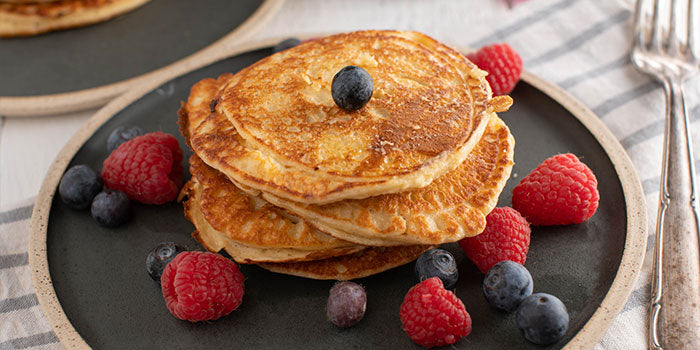If you're into fitness or trying to up your protein intake, you've probably heard of whey protein. It's a popular supplement known for its muscle-building benefits and quick absorption. However, if you're lactose intolerant or have dairy-related concerns, you may wonder, "Does whey protein have lactose?"
Whey protein, in particular, has gained immense popularity for its effectiveness in promoting lean muscle development. However, for individuals who are lactose intolerant or have dairy allergies, whey protein may just not work.
This article delves into whey protein, its lactose content (or lack thereof), and why it's a suitable option for many. In the world of fitness and nutrition, protein is a powerhouse nutrient. It's essential for muscle growth and repair.
Understanding Whey Protein
Whey protein is a high-quality protein derived from milk during the cheese-making process. It's a complete protein containing all the essential amino acids our bodies need for various functions, including muscle growth and repair.
Does Whey Protein Contain Lactose?
Now, here comes the critical question: Does whey protein have lactose? Let's dig deeper. Lactose is a sugar naturally found in milk and dairy products. Most of the lactose is removed through filtration during the manufacturing of whey protein.
Shop & Save on Organic Weight Management Products
Here is the tricky part though, the removal of lactose also depends on the type of whey protein you're consuming.
-
Whey Protein Isolate
Whey protein isolate is a highly processed form of whey protein containing very little lactose. During the manufacturing process, most of the lactose is removed.
-
Whey Protein Concentrate
Whey protein concentrate, on the other hand, retains a higher amount of lactose compared to isolate. While the lactose content varies among products, it's typically not recommended for those with lactose intolerance.
-
Whey Protein Hydrolysate
Whey protein hydrolysate is another option, often called "pre-digested" whey. It undergoes further processing to break down proteins, including lactose, making it a suitable choice for many people.
Processing Whey Protein
To determine whether whey protein contains lactose, it's essential to grasp the extraction process. Milk is separated into curds and whey during the production of whey protein.
The curds make cheese, while the liquid whey is processed further to obtain whey protein. Most of the lactose present in milk is removed during this extraction process.
Shop & Save on Organic Protein
Whey protein goes through several processing steps before it reaches your supplement jug. Here's how it works:
- Collection: The journey begins with collecting milk containing two primary proteins: casein and whey.
- Filtration: The milk undergoes filtration to separate the whey protein from the casein protein. This process significantly reduces the lactose content.
- Isolation: The separated whey is then further processed to isolate the whey protein. This isolation removes most of the remaining lactose, making it lactose-free or nearly lactose-free.
- Drying: The isolated whey protein is dried to create the powder in protein supplements.
Lactose Intolerance and Whey Protein
Now that we understand the processing behind whey protein let's discuss why it's often a safe choice for individuals with lactose intolerance.
The Origins of Whey Protein
Again, whey protein is a high-quality protein derived from milk during the cheese-making process. It's separated from the liquid part of milk, known as whey. Initially, whey was considered a waste product, but today, it's recognized as a nutritional goldmine.
Lactose Intolerance Explained
Lactose intolerance is the inability to digest lactose effectively due to a lactase deficiency, the enzyme responsible for breaking down lactose in the small intestine.
To digest lactose properly, our bodies produce an enzyme called lactase. However, some individuals have a limited or deficient lactase supply, leading to lactose intolerance.
Shop & Save on Collagen Supplements
Common symptoms of lactose intolerance include bloating, gas, diarrhea, and stomach cramps after consuming dairy products. Many people seek lactose-free alternatives to avoid these uncomfortable symptoms, including lactose-free milk, cheese, and whey protein.
Low Lactose Levels in Whey Protein
Because the filtration and isolation processes remove a significant portion of lactose, whey protein typically contains very little lactose, if any. This makes it a well-tolerated option for many people with lactose intolerance.
However, individual tolerance levels can vary, so monitoring your body's response is essential and consulting with your doctor before consuming any supplement is always a good idea.
Besides being lactose-free or low in lactose, whey protein boasts excellent digestibility and bioavailability. This means your body can absorb and utilize its amino acids efficiently, making it a perfect choice for post-workout recovery and muscle growth.
Plant-Based Protein Powder – Lactose-Free
Whey protein has been the go-to choice for athletes and fitness enthusiasts looking to boost their protein intake for years. However, as awareness of dietary preferences and healthy lifestyle considerations has grown, plant-based protein powder has emerged as a compelling alternative to whey.
Shop & Save on Superfood Supplements
Plant-based protein powder is a good substitute and often a superior choice for meeting your body's protein needs.
Lactose-Free
One significant advantage of plant-based protein powder over whey protein is that it is lactose-free. This is a game-changer for individuals with lactose intolerance, as they can enjoy plant-based protein without the worry of digestive discomfort.
Easy on Digestion
Plant-based protein powders are known for their ease of digestion. They are generally gentler on the stomach than whey protein. The smooth and creamy texture of plant-based protein makes it an ideal option for individuals looking to avoid digestive discomfort while still meeting their protein needs.
Balanced Nutritional Profile
Plant-based protein powders offer a balanced nutritional profile. They are often rich in essential amino acids, which are the building blocks of protein and can provide all the necessary nutrients your body requires for muscle repair and growth.
Many plant-based protein powders also contain added benefits like fiber, vitamins, and minerals, further contributing to overall healthy lifestyle and well-being.
Vegan-Friendly
Plant-based protein powders align with ethical dietary choices. They are often a perfect fit for vegans and vegetarians, ensuring that individuals following these lifestyles can maintain their protein intake without compromising their values.
Diverse Protein Sources
Plant-based protein powders are sourced from various plant foods, such as peas, rice, hemp, and soy. This diversity in protein sources ensures that you receive a wide range of nutrients and amino acids, which can contribute to a more well-rounded and comprehensive diet.
Shop & Save on Immune Support Supplements
By incorporating different plant-based protein sources, you can enhance the overall nutritional value of your protein powder.
Why Choose Purely Inspired for Your Protein Needs?
Maintaining a healthy lifestyle can be challenging in today's fast-paced world. Balancing work, family, and personal well-being often leaves little time for conscious dietary choices.
That's where Purely Inspired Organic Protein comes to the rescue. With a new and improved formula, this plant-based protein powder is the perfect companion to support your fitness journey.
Protein Powerhouse with a Flavorful Twist
Purely Inspired Organic Protein has undergone a fantastic inside and out makeover. packed with a whopping 20g of plant-based protein per serving, it offers a better taste than ever. This protein powder isn't just good for you; it's a delicious addition to your daily routine.
Vegan-Friendly
This plant-based protein is vegan-friendly and free from dairy and gluten. It's a versatile choice that fits various dietary preferences and restrictions, making it accessible to many individuals.
Only 2g of Sugar, 5g of Fiber
One of the standout features of Purely Inspired Organic Protein is its exceptional nutritional profile. Each serving contains only 2g of sugar, making it an excellent choice for those watching their sugar intake. It also packs 5g of dietary fiber! It's a win-win for your taste buds and your body.
Pure Ingredients
When you choose Purely Inspired Organic Protein, you're opting for a pure formula with ingredients you can trust. No artificial flavors, colors, or sweeteners lurking in this protein powder. You can confidently enjoy your protein boost, knowing that you're fueling your body with quality nutrition.
Endless Mixing Possibilities
Purely Inspired Organic Protein offers a smooth and creamy texture that can elevate your culinary creations. The options are endless, whether adding it to water for a quick and easy protein boost or blending it into a delicious smoothie.
You can even incorporate it into your favorite baked goods like muffins, pancakes, and cookies, turning them into nutritious treats. It's a simple and tasty way to get extra nutrition into your day.
Convenience on the Go
Mornings can be chaotic for anyone; some days, they just need more time. Purely inspired organic protein comes to the rescue with its convenience factor. You can whip up a protein energy bite to kick-start your day or prepare a smoothie for your commute in no time. It's the perfect anytime, any-place companion for your busy lifestyle.
Purely inspired organic protein powder is more than just a supplement; it's a flavorful and nutritious addition to your daily routine. With its protein content, vegan-friendly nature, and pure ingredients, it checks all the boxes for a health-conscious individual.
Whether blending it into a smoothie or adding it to your baked goods, this protein powder makes maintaining your fitness goals much more manageable. Say goodbye to guesswork and hello to a tasty protein source with purely inspired. Your healthy lifestyle and taste buds will thank you!
Conclusion
In healthy fitness lifestyle, whey protein is a valuable asset. Fortunately, most whey protein products are designed to be lactose-free or nearly lactose-free. This makes them an excellent choice for individuals looking to meet their protein needs while following a healthy lifestyle. So, the next time you ask, "Does whey protein have lactose?" remember that the answer depends on the whey protein you choose.
With Purely Inspired plant-based protein, you can confidently enjoy the benefits of this exceptional protein source while staying on track with your fitness goals. Say hello to a more decisive you with Purely Inspired organic protein.
At Purely Inspired.com, we understand the importance of providing you with top-notch well-being products, and our plant-based protein can help you meet your fitness and dietary goals without worry.
So, whether you want to build muscle, enhance your fitness journey, or simply increase your daily protein intake, you can confidently incorporate whey protein into your diet. Remember to consult with a healthcare professional if you have specific dietary concerns or allergies, and always choose products from trusted brands like Purely Inspired for your well-being needs. Get started on your fitness goals today with vegan-friendly whey protein – it's the tasty and effective way to support your body's needs.
Check out our Most Loved Organic Supplements Online
Read More Blogs:



